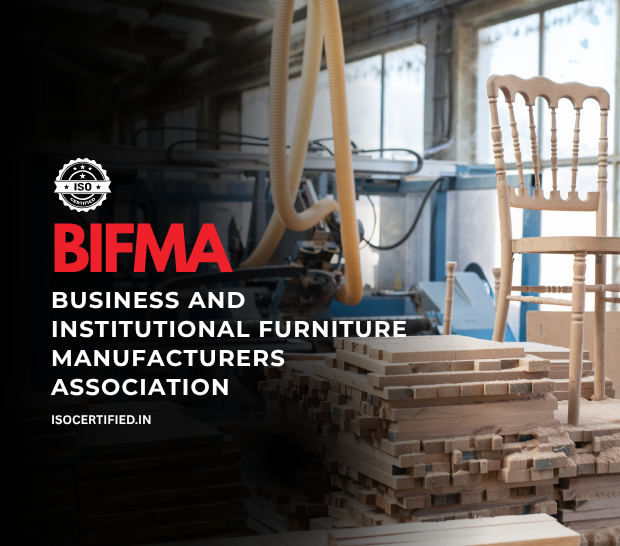- Globally Recognized Certification
BIFMA - Business and Institutional Furniture Manufacturers Association
BIFMA Certification verifies that commercial and institutional furniture products meet rigorous safety, durability, and performance standards through independent testing and verification. This certification ensures furniture withstands intensive use in commercial environments while meeting structural integrity, stability, and ergonomic requirements.
Request A Free Quote
What is BIFMA – Business and Institutional Furniture Manufacturers Association Certification
BIFMA Certification is an industry-recognized verification confirming that office and institutional furniture products comply with ANSI/BIFMA standards covering safety, durability, structural adequacy, and performance requirements for commercial-grade furniture. This certification involves comprehensive testing protocols evaluating seating strength, desk stability, storage unit durability, caster performance, and ergonomic functionality under simulated commercial use conditions. BIFMA standards address critical safety factors including tip resistance, structural failure prevention, sharp edge elimination, and load-bearing capacity ensuring furniture performs reliably throughout expected service life in demanding institutional environments.
The certification process requires independent laboratory testing by accredited facilities that conduct drop tests, cyclic loading, impact resistance, stability assessments, and environmental conditioning on representative product samples. Certified products demonstrate compliance with specific BIFMA standards applicable to their category such as X5.1 for office seating, X5.5 for desk products, X5.9 for storage units, and e3 for sustainability performance. Manufacturers must maintain quality control systems ensuring production consistency with tested samples and provide transparent documentation supporting certification claims.

- Benifits
Key Benefits of BIFMA Certification
This certification provides competitive market advantage, satisfies commercial procurement requirements, reduces liability risks, and demonstrates commitment to quality and safety that influences purchasing decisions in institutional markets.
Commercial Procurement Eligibility
Meet mandatory requirements for government, corporate, and institutional tenders where BIFMA certification is specified in furniture procurement specifications.
Product Liability Protection
Reduce legal exposure and warranty claims through certified products that meet established safety standards and performance benchmarks.
Market Credibility Enhancement
Differentiate products with independent third-party verification that validates quality claims and builds buyer confidence in commercial markets.
Specification Compliance Assurance
Enable architects, designers, and facility managers to specify products confidently knowing they meet recognized industry performance standards.
- Standard Process
Your Path to ISO Certification
Four straightforward steps to achieve ISO certification: consultation, documentation, payment, and certificate delivery—all managed remotely for your convenience.
Free Consultation
Connect with our ISO experts to discuss your certification needs and requirements.
E-mail Documents
Submit your organization's documents and information securely via email.
Make Payment Online
Complete your payment conveniently through our secure online payment gateway.
Get ISO Certificate
Receive your internationally recognized ISO certification upon successful audit completion.
- Which Industries?
Who Needs This
Office furniture manufacturers, institutional furniture suppliers, contract furniture producers, and seating manufacturers targeting commercial and government markets require BIFMA certification. Companies bidding on large-scale furniture contracts for corporate and educational facilities need this credential.
Office Furniture Manufacturing
Educational Furniture Suppliers
Healthcare Furniture Providers
Contract Furniture & Seating
- Ongoing Requirements
Compliance & Maintenance
Post-certification, organizations must fulfill ongoing requirements including annual surveillance audits, internal reviews, and recertification to maintain their ISO certificate validity.
Annual Surveillance Audits
Certification bodies conduct yearly audits to verify continuous compliance with ISO standards and ensure your management system remains effective and up-to-date.
Recertification Every 3 Years
Complete recertification audit required every three years to renew your ISO certificate and demonstrate sustained commitment to quality management excellence.
Internal Audits & Reviews
Regular internal audits and management reviews must be conducted to monitor performance, identify improvements, and prepare for external certification audits.
Documentation & Training Updates
Maintain current documentation, update procedures for process changes, and provide ongoing training to employees on ISO requirements and their responsibilities.
